Strategic Management Report: Costa Group's Agribusiness Operations
VerifiedAdded on 2022/08/26
|13
|3283
|28
Report
AI Summary
This report undertakes a comprehensive analysis of Costa Group, a major player in the Australian agribusiness sector, focusing on its strategic management practices. The report begins with an executive summary and introduction, providing an overview of the company and the industry. It then delves into the external environment of the agribusiness, utilizing the PESTEL framework to assess the political, economic, social, technological, environmental, and legal factors impacting Costa Group. The internal environment is examined through the VRIO framework to evaluate the company's core competencies and capabilities, ultimately determining its sustainable competitive advantage. The report also offers strategic recommendations for Costa Group to enhance its market position, strengthen its distribution network, improve consumer relations, and adapt to global market dynamics. The conclusion summarizes the key findings and insights, emphasizing the importance of strategic management in the company's continued success.
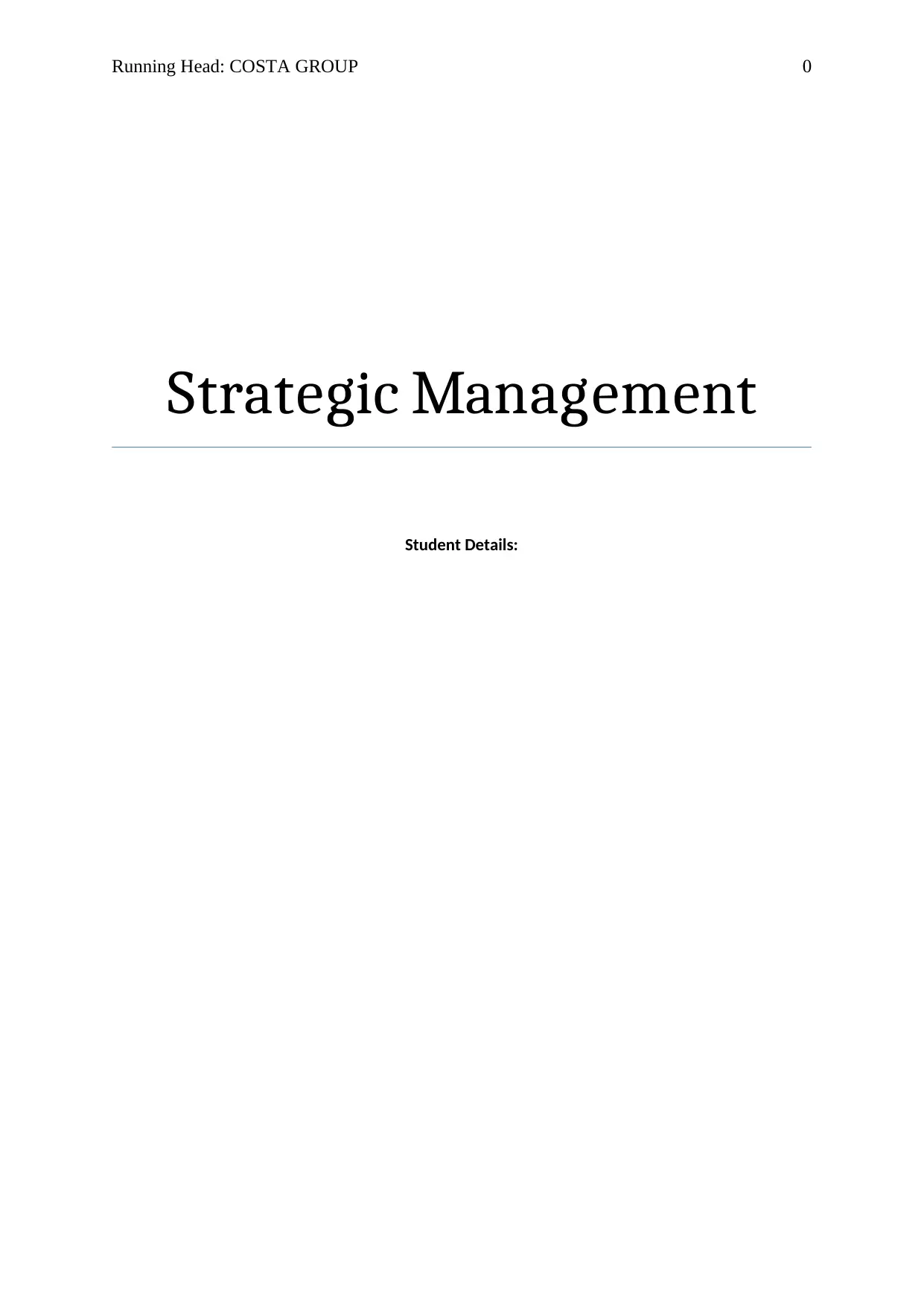
Running Head: COSTA GROUP 0
Strategic Management
Student Details:
Strategic Management
Student Details:
Paraphrase This Document
Need a fresh take? Get an instant paraphrase of this document with our AI Paraphraser
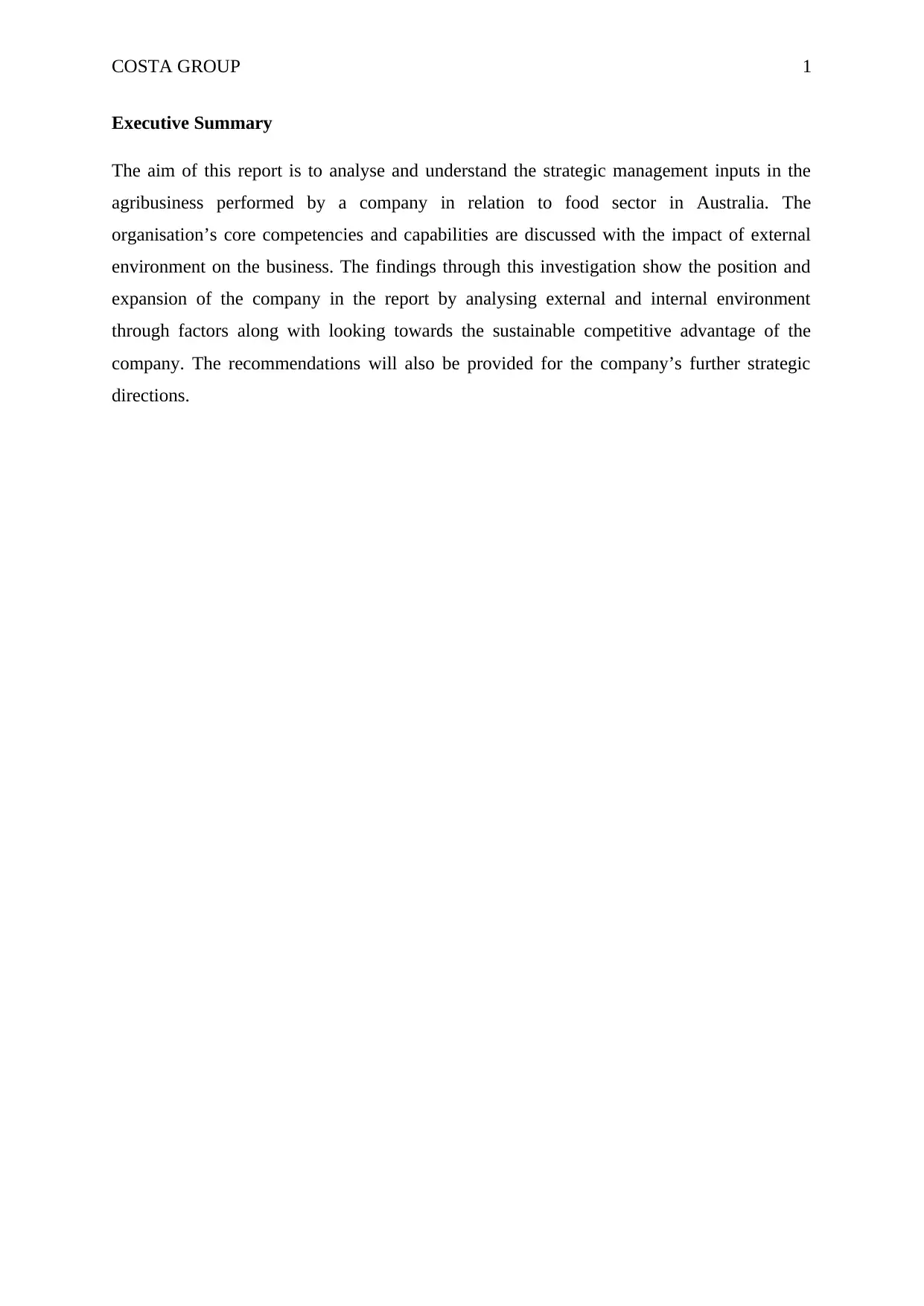
COSTA GROUP 1
Executive Summary
The aim of this report is to analyse and understand the strategic management inputs in the
agribusiness performed by a company in relation to food sector in Australia. The
organisation’s core competencies and capabilities are discussed with the impact of external
environment on the business. The findings through this investigation show the position and
expansion of the company in the report by analysing external and internal environment
through factors along with looking towards the sustainable competitive advantage of the
company. The recommendations will also be provided for the company’s further strategic
directions.
Executive Summary
The aim of this report is to analyse and understand the strategic management inputs in the
agribusiness performed by a company in relation to food sector in Australia. The
organisation’s core competencies and capabilities are discussed with the impact of external
environment on the business. The findings through this investigation show the position and
expansion of the company in the report by analysing external and internal environment
through factors along with looking towards the sustainable competitive advantage of the
company. The recommendations will also be provided for the company’s further strategic
directions.
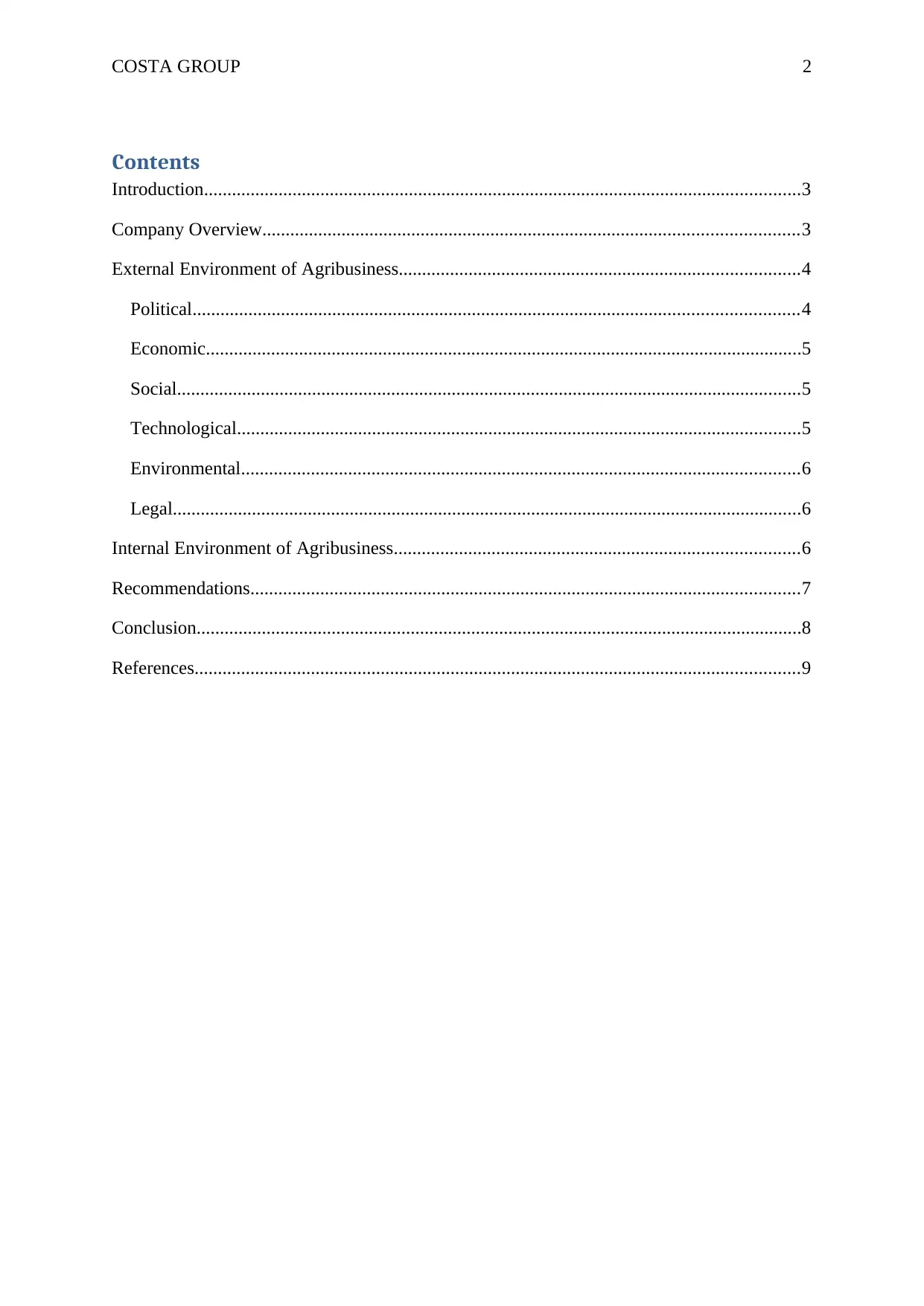
COSTA GROUP 2
Contents
Introduction................................................................................................................................3
Company Overview...................................................................................................................3
External Environment of Agribusiness......................................................................................4
Political..................................................................................................................................4
Economic................................................................................................................................5
Social......................................................................................................................................5
Technological.........................................................................................................................5
Environmental........................................................................................................................6
Legal.......................................................................................................................................6
Internal Environment of Agribusiness.......................................................................................6
Recommendations......................................................................................................................7
Conclusion..................................................................................................................................8
References..................................................................................................................................9
Contents
Introduction................................................................................................................................3
Company Overview...................................................................................................................3
External Environment of Agribusiness......................................................................................4
Political..................................................................................................................................4
Economic................................................................................................................................5
Social......................................................................................................................................5
Technological.........................................................................................................................5
Environmental........................................................................................................................6
Legal.......................................................................................................................................6
Internal Environment of Agribusiness.......................................................................................6
Recommendations......................................................................................................................7
Conclusion..................................................................................................................................8
References..................................................................................................................................9
⊘ This is a preview!⊘
Do you want full access?
Subscribe today to unlock all pages.

Trusted by 1+ million students worldwide
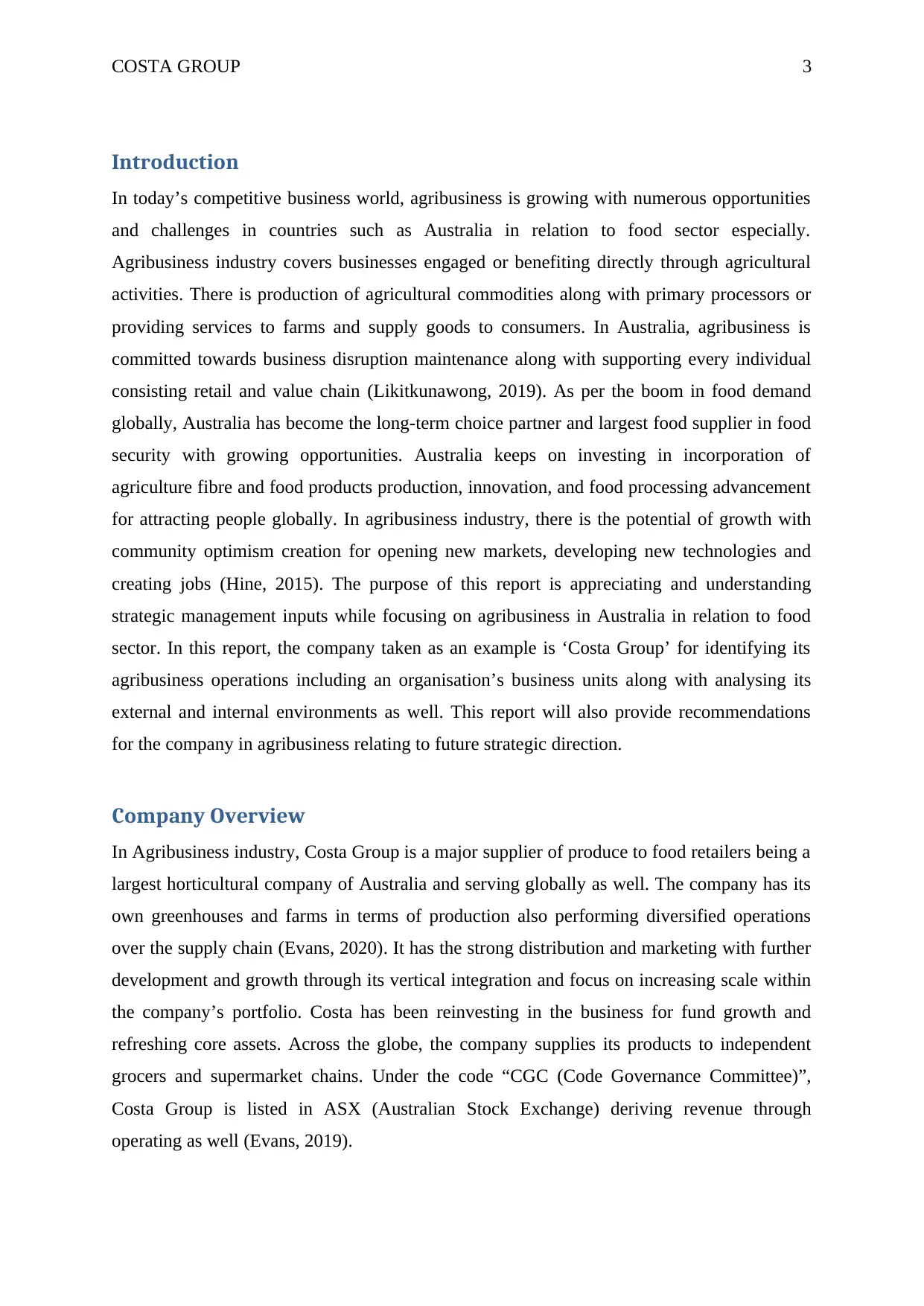
COSTA GROUP 3
Introduction
In today’s competitive business world, agribusiness is growing with numerous opportunities
and challenges in countries such as Australia in relation to food sector especially.
Agribusiness industry covers businesses engaged or benefiting directly through agricultural
activities. There is production of agricultural commodities along with primary processors or
providing services to farms and supply goods to consumers. In Australia, agribusiness is
committed towards business disruption maintenance along with supporting every individual
consisting retail and value chain (Likitkunawong, 2019). As per the boom in food demand
globally, Australia has become the long-term choice partner and largest food supplier in food
security with growing opportunities. Australia keeps on investing in incorporation of
agriculture fibre and food products production, innovation, and food processing advancement
for attracting people globally. In agribusiness industry, there is the potential of growth with
community optimism creation for opening new markets, developing new technologies and
creating jobs (Hine, 2015). The purpose of this report is appreciating and understanding
strategic management inputs while focusing on agribusiness in Australia in relation to food
sector. In this report, the company taken as an example is ‘Costa Group’ for identifying its
agribusiness operations including an organisation’s business units along with analysing its
external and internal environments as well. This report will also provide recommendations
for the company in agribusiness relating to future strategic direction.
Company Overview
In Agribusiness industry, Costa Group is a major supplier of produce to food retailers being a
largest horticultural company of Australia and serving globally as well. The company has its
own greenhouses and farms in terms of production also performing diversified operations
over the supply chain (Evans, 2020). It has the strong distribution and marketing with further
development and growth through its vertical integration and focus on increasing scale within
the company’s portfolio. Costa has been reinvesting in the business for fund growth and
refreshing core assets. Across the globe, the company supplies its products to independent
grocers and supermarket chains. Under the code “CGC (Code Governance Committee)”,
Costa Group is listed in ASX (Australian Stock Exchange) deriving revenue through
operating as well (Evans, 2019).
Introduction
In today’s competitive business world, agribusiness is growing with numerous opportunities
and challenges in countries such as Australia in relation to food sector especially.
Agribusiness industry covers businesses engaged or benefiting directly through agricultural
activities. There is production of agricultural commodities along with primary processors or
providing services to farms and supply goods to consumers. In Australia, agribusiness is
committed towards business disruption maintenance along with supporting every individual
consisting retail and value chain (Likitkunawong, 2019). As per the boom in food demand
globally, Australia has become the long-term choice partner and largest food supplier in food
security with growing opportunities. Australia keeps on investing in incorporation of
agriculture fibre and food products production, innovation, and food processing advancement
for attracting people globally. In agribusiness industry, there is the potential of growth with
community optimism creation for opening new markets, developing new technologies and
creating jobs (Hine, 2015). The purpose of this report is appreciating and understanding
strategic management inputs while focusing on agribusiness in Australia in relation to food
sector. In this report, the company taken as an example is ‘Costa Group’ for identifying its
agribusiness operations including an organisation’s business units along with analysing its
external and internal environments as well. This report will also provide recommendations
for the company in agribusiness relating to future strategic direction.
Company Overview
In Agribusiness industry, Costa Group is a major supplier of produce to food retailers being a
largest horticultural company of Australia and serving globally as well. The company has its
own greenhouses and farms in terms of production also performing diversified operations
over the supply chain (Evans, 2020). It has the strong distribution and marketing with further
development and growth through its vertical integration and focus on increasing scale within
the company’s portfolio. Costa has been reinvesting in the business for fund growth and
refreshing core assets. Across the globe, the company supplies its products to independent
grocers and supermarket chains. Under the code “CGC (Code Governance Committee)”,
Costa Group is listed in ASX (Australian Stock Exchange) deriving revenue through
operating as well (Evans, 2019).
Paraphrase This Document
Need a fresh take? Get an instant paraphrase of this document with our AI Paraphraser
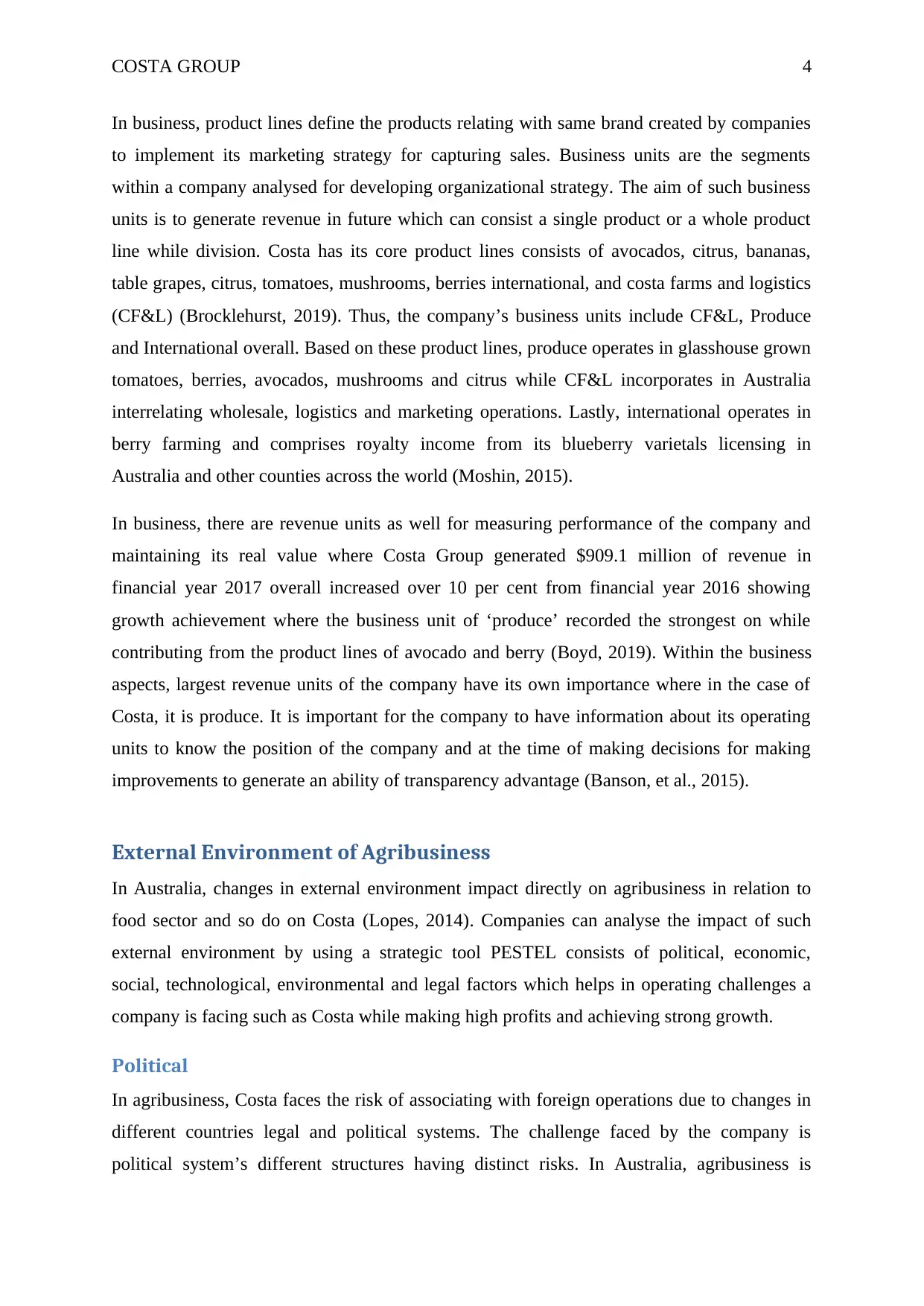
COSTA GROUP 4
In business, product lines define the products relating with same brand created by companies
to implement its marketing strategy for capturing sales. Business units are the segments
within a company analysed for developing organizational strategy. The aim of such business
units is to generate revenue in future which can consist a single product or a whole product
line while division. Costa has its core product lines consists of avocados, citrus, bananas,
table grapes, citrus, tomatoes, mushrooms, berries international, and costa farms and logistics
(CF&L) (Brocklehurst, 2019). Thus, the company’s business units include CF&L, Produce
and International overall. Based on these product lines, produce operates in glasshouse grown
tomatoes, berries, avocados, mushrooms and citrus while CF&L incorporates in Australia
interrelating wholesale, logistics and marketing operations. Lastly, international operates in
berry farming and comprises royalty income from its blueberry varietals licensing in
Australia and other counties across the world (Moshin, 2015).
In business, there are revenue units as well for measuring performance of the company and
maintaining its real value where Costa Group generated $909.1 million of revenue in
financial year 2017 overall increased over 10 per cent from financial year 2016 showing
growth achievement where the business unit of ‘produce’ recorded the strongest on while
contributing from the product lines of avocado and berry (Boyd, 2019). Within the business
aspects, largest revenue units of the company have its own importance where in the case of
Costa, it is produce. It is important for the company to have information about its operating
units to know the position of the company and at the time of making decisions for making
improvements to generate an ability of transparency advantage (Banson, et al., 2015).
External Environment of Agribusiness
In Australia, changes in external environment impact directly on agribusiness in relation to
food sector and so do on Costa (Lopes, 2014). Companies can analyse the impact of such
external environment by using a strategic tool PESTEL consists of political, economic,
social, technological, environmental and legal factors which helps in operating challenges a
company is facing such as Costa while making high profits and achieving strong growth.
Political
In agribusiness, Costa faces the risk of associating with foreign operations due to changes in
different countries legal and political systems. The challenge faced by the company is
political system’s different structures having distinct risks. In Australia, agribusiness is
In business, product lines define the products relating with same brand created by companies
to implement its marketing strategy for capturing sales. Business units are the segments
within a company analysed for developing organizational strategy. The aim of such business
units is to generate revenue in future which can consist a single product or a whole product
line while division. Costa has its core product lines consists of avocados, citrus, bananas,
table grapes, citrus, tomatoes, mushrooms, berries international, and costa farms and logistics
(CF&L) (Brocklehurst, 2019). Thus, the company’s business units include CF&L, Produce
and International overall. Based on these product lines, produce operates in glasshouse grown
tomatoes, berries, avocados, mushrooms and citrus while CF&L incorporates in Australia
interrelating wholesale, logistics and marketing operations. Lastly, international operates in
berry farming and comprises royalty income from its blueberry varietals licensing in
Australia and other counties across the world (Moshin, 2015).
In business, there are revenue units as well for measuring performance of the company and
maintaining its real value where Costa Group generated $909.1 million of revenue in
financial year 2017 overall increased over 10 per cent from financial year 2016 showing
growth achievement where the business unit of ‘produce’ recorded the strongest on while
contributing from the product lines of avocado and berry (Boyd, 2019). Within the business
aspects, largest revenue units of the company have its own importance where in the case of
Costa, it is produce. It is important for the company to have information about its operating
units to know the position of the company and at the time of making decisions for making
improvements to generate an ability of transparency advantage (Banson, et al., 2015).
External Environment of Agribusiness
In Australia, changes in external environment impact directly on agribusiness in relation to
food sector and so do on Costa (Lopes, 2014). Companies can analyse the impact of such
external environment by using a strategic tool PESTEL consists of political, economic,
social, technological, environmental and legal factors which helps in operating challenges a
company is facing such as Costa while making high profits and achieving strong growth.
Political
In agribusiness, Costa faces the risk of associating with foreign operations due to changes in
different countries legal and political systems. The challenge faced by the company is
political system’s different structures having distinct risks. In Australia, agribusiness is
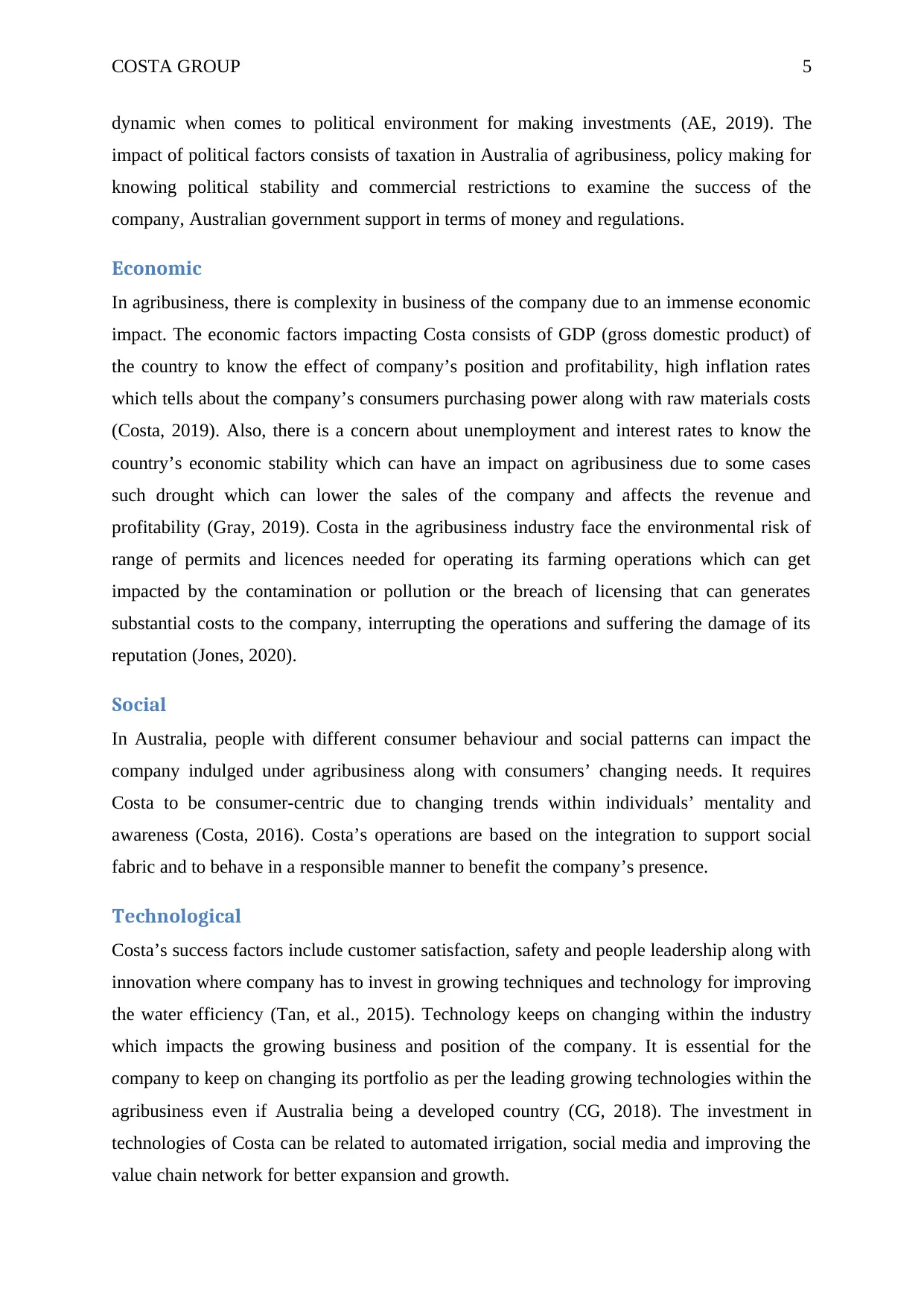
COSTA GROUP 5
dynamic when comes to political environment for making investments (AE, 2019). The
impact of political factors consists of taxation in Australia of agribusiness, policy making for
knowing political stability and commercial restrictions to examine the success of the
company, Australian government support in terms of money and regulations.
Economic
In agribusiness, there is complexity in business of the company due to an immense economic
impact. The economic factors impacting Costa consists of GDP (gross domestic product) of
the country to know the effect of company’s position and profitability, high inflation rates
which tells about the company’s consumers purchasing power along with raw materials costs
(Costa, 2019). Also, there is a concern about unemployment and interest rates to know the
country’s economic stability which can have an impact on agribusiness due to some cases
such drought which can lower the sales of the company and affects the revenue and
profitability (Gray, 2019). Costa in the agribusiness industry face the environmental risk of
range of permits and licences needed for operating its farming operations which can get
impacted by the contamination or pollution or the breach of licensing that can generates
substantial costs to the company, interrupting the operations and suffering the damage of its
reputation (Jones, 2020).
Social
In Australia, people with different consumer behaviour and social patterns can impact the
company indulged under agribusiness along with consumers’ changing needs. It requires
Costa to be consumer-centric due to changing trends within individuals’ mentality and
awareness (Costa, 2016). Costa’s operations are based on the integration to support social
fabric and to behave in a responsible manner to benefit the company’s presence.
Technological
Costa’s success factors include customer satisfaction, safety and people leadership along with
innovation where company has to invest in growing techniques and technology for improving
the water efficiency (Tan, et al., 2015). Technology keeps on changing within the industry
which impacts the growing business and position of the company. It is essential for the
company to keep on changing its portfolio as per the leading growing technologies within the
agribusiness even if Australia being a developed country (CG, 2018). The investment in
technologies of Costa can be related to automated irrigation, social media and improving the
value chain network for better expansion and growth.
dynamic when comes to political environment for making investments (AE, 2019). The
impact of political factors consists of taxation in Australia of agribusiness, policy making for
knowing political stability and commercial restrictions to examine the success of the
company, Australian government support in terms of money and regulations.
Economic
In agribusiness, there is complexity in business of the company due to an immense economic
impact. The economic factors impacting Costa consists of GDP (gross domestic product) of
the country to know the effect of company’s position and profitability, high inflation rates
which tells about the company’s consumers purchasing power along with raw materials costs
(Costa, 2019). Also, there is a concern about unemployment and interest rates to know the
country’s economic stability which can have an impact on agribusiness due to some cases
such drought which can lower the sales of the company and affects the revenue and
profitability (Gray, 2019). Costa in the agribusiness industry face the environmental risk of
range of permits and licences needed for operating its farming operations which can get
impacted by the contamination or pollution or the breach of licensing that can generates
substantial costs to the company, interrupting the operations and suffering the damage of its
reputation (Jones, 2020).
Social
In Australia, people with different consumer behaviour and social patterns can impact the
company indulged under agribusiness along with consumers’ changing needs. It requires
Costa to be consumer-centric due to changing trends within individuals’ mentality and
awareness (Costa, 2016). Costa’s operations are based on the integration to support social
fabric and to behave in a responsible manner to benefit the company’s presence.
Technological
Costa’s success factors include customer satisfaction, safety and people leadership along with
innovation where company has to invest in growing techniques and technology for improving
the water efficiency (Tan, et al., 2015). Technology keeps on changing within the industry
which impacts the growing business and position of the company. It is essential for the
company to keep on changing its portfolio as per the leading growing technologies within the
agribusiness even if Australia being a developed country (CG, 2018). The investment in
technologies of Costa can be related to automated irrigation, social media and improving the
value chain network for better expansion and growth.
⊘ This is a preview!⊘
Do you want full access?
Subscribe today to unlock all pages.

Trusted by 1+ million students worldwide
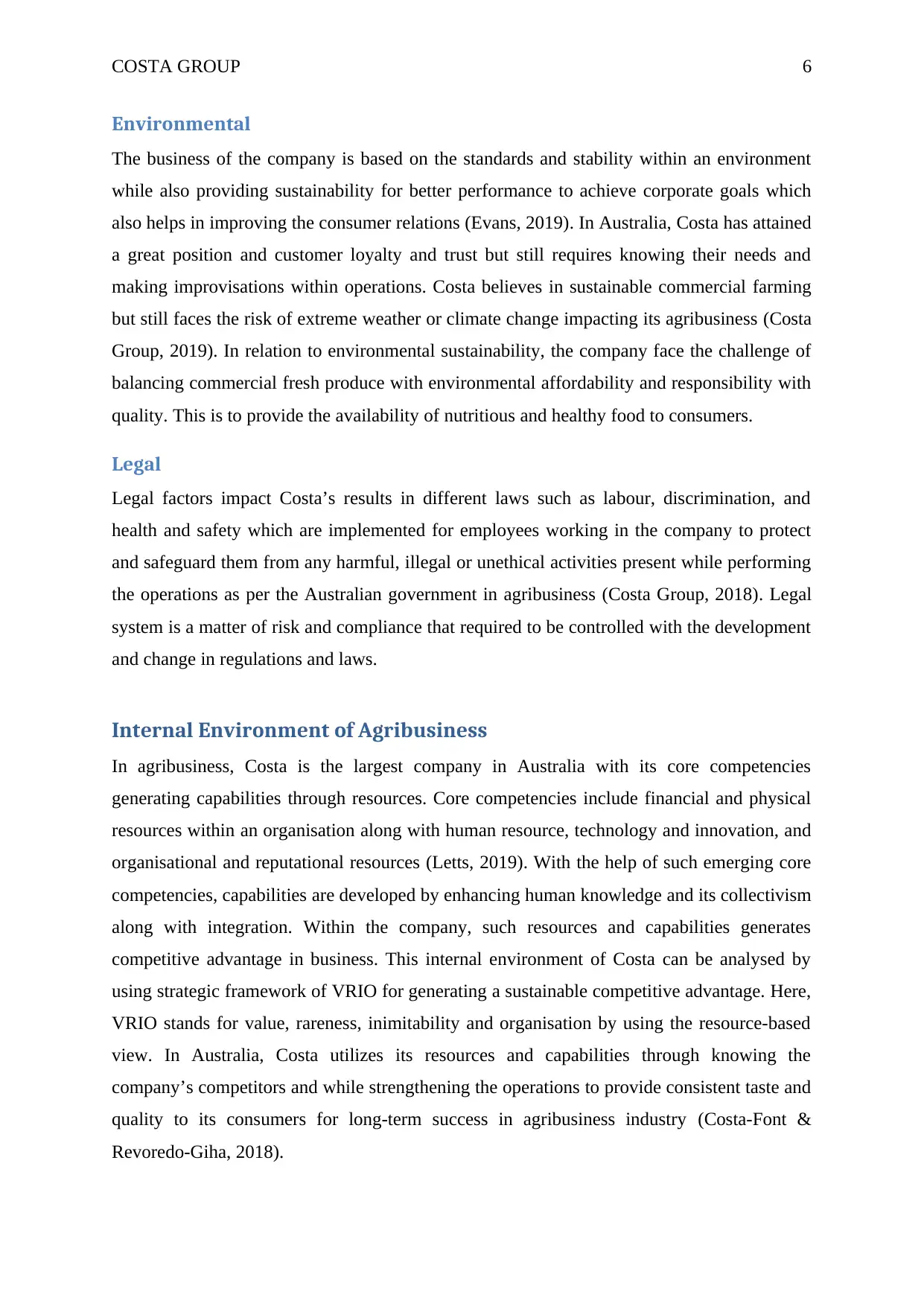
COSTA GROUP 6
Environmental
The business of the company is based on the standards and stability within an environment
while also providing sustainability for better performance to achieve corporate goals which
also helps in improving the consumer relations (Evans, 2019). In Australia, Costa has attained
a great position and customer loyalty and trust but still requires knowing their needs and
making improvisations within operations. Costa believes in sustainable commercial farming
but still faces the risk of extreme weather or climate change impacting its agribusiness (Costa
Group, 2019). In relation to environmental sustainability, the company face the challenge of
balancing commercial fresh produce with environmental affordability and responsibility with
quality. This is to provide the availability of nutritious and healthy food to consumers.
Legal
Legal factors impact Costa’s results in different laws such as labour, discrimination, and
health and safety which are implemented for employees working in the company to protect
and safeguard them from any harmful, illegal or unethical activities present while performing
the operations as per the Australian government in agribusiness (Costa Group, 2018). Legal
system is a matter of risk and compliance that required to be controlled with the development
and change in regulations and laws.
Internal Environment of Agribusiness
In agribusiness, Costa is the largest company in Australia with its core competencies
generating capabilities through resources. Core competencies include financial and physical
resources within an organisation along with human resource, technology and innovation, and
organisational and reputational resources (Letts, 2019). With the help of such emerging core
competencies, capabilities are developed by enhancing human knowledge and its collectivism
along with integration. Within the company, such resources and capabilities generates
competitive advantage in business. This internal environment of Costa can be analysed by
using strategic framework of VRIO for generating a sustainable competitive advantage. Here,
VRIO stands for value, rareness, inimitability and organisation by using the resource-based
view. In Australia, Costa utilizes its resources and capabilities through knowing the
company’s competitors and while strengthening the operations to provide consistent taste and
quality to its consumers for long-term success in agribusiness industry (Costa‐Font &
Revoredo‐Giha, 2018).
Environmental
The business of the company is based on the standards and stability within an environment
while also providing sustainability for better performance to achieve corporate goals which
also helps in improving the consumer relations (Evans, 2019). In Australia, Costa has attained
a great position and customer loyalty and trust but still requires knowing their needs and
making improvisations within operations. Costa believes in sustainable commercial farming
but still faces the risk of extreme weather or climate change impacting its agribusiness (Costa
Group, 2019). In relation to environmental sustainability, the company face the challenge of
balancing commercial fresh produce with environmental affordability and responsibility with
quality. This is to provide the availability of nutritious and healthy food to consumers.
Legal
Legal factors impact Costa’s results in different laws such as labour, discrimination, and
health and safety which are implemented for employees working in the company to protect
and safeguard them from any harmful, illegal or unethical activities present while performing
the operations as per the Australian government in agribusiness (Costa Group, 2018). Legal
system is a matter of risk and compliance that required to be controlled with the development
and change in regulations and laws.
Internal Environment of Agribusiness
In agribusiness, Costa is the largest company in Australia with its core competencies
generating capabilities through resources. Core competencies include financial and physical
resources within an organisation along with human resource, technology and innovation, and
organisational and reputational resources (Letts, 2019). With the help of such emerging core
competencies, capabilities are developed by enhancing human knowledge and its collectivism
along with integration. Within the company, such resources and capabilities generates
competitive advantage in business. This internal environment of Costa can be analysed by
using strategic framework of VRIO for generating a sustainable competitive advantage. Here,
VRIO stands for value, rareness, inimitability and organisation by using the resource-based
view. In Australia, Costa utilizes its resources and capabilities through knowing the
company’s competitors and while strengthening the operations to provide consistent taste and
quality to its consumers for long-term success in agribusiness industry (Costa‐Font &
Revoredo‐Giha, 2018).
Paraphrase This Document
Need a fresh take? Get an instant paraphrase of this document with our AI Paraphraser
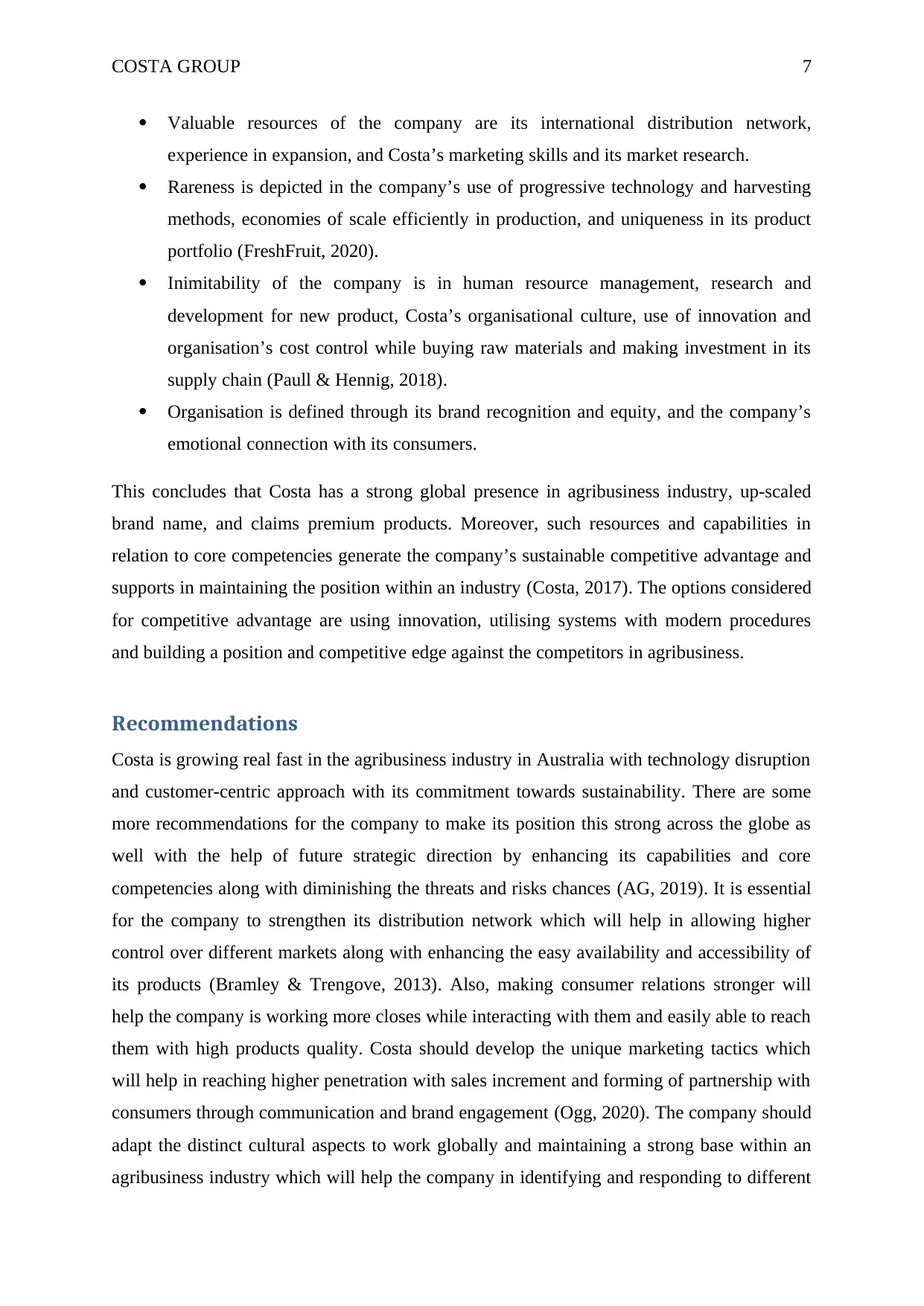
COSTA GROUP 7
Valuable resources of the company are its international distribution network,
experience in expansion, and Costa’s marketing skills and its market research.
Rareness is depicted in the company’s use of progressive technology and harvesting
methods, economies of scale efficiently in production, and uniqueness in its product
portfolio (FreshFruit, 2020).
Inimitability of the company is in human resource management, research and
development for new product, Costa’s organisational culture, use of innovation and
organisation’s cost control while buying raw materials and making investment in its
supply chain (Paull & Hennig, 2018).
Organisation is defined through its brand recognition and equity, and the company’s
emotional connection with its consumers.
This concludes that Costa has a strong global presence in agribusiness industry, up-scaled
brand name, and claims premium products. Moreover, such resources and capabilities in
relation to core competencies generate the company’s sustainable competitive advantage and
supports in maintaining the position within an industry (Costa, 2017). The options considered
for competitive advantage are using innovation, utilising systems with modern procedures
and building a position and competitive edge against the competitors in agribusiness.
Recommendations
Costa is growing real fast in the agribusiness industry in Australia with technology disruption
and customer-centric approach with its commitment towards sustainability. There are some
more recommendations for the company to make its position this strong across the globe as
well with the help of future strategic direction by enhancing its capabilities and core
competencies along with diminishing the threats and risks chances (AG, 2019). It is essential
for the company to strengthen its distribution network which will help in allowing higher
control over different markets along with enhancing the easy availability and accessibility of
its products (Bramley & Trengove, 2013). Also, making consumer relations stronger will
help the company is working more closes while interacting with them and easily able to reach
them with high products quality. Costa should develop the unique marketing tactics which
will help in reaching higher penetration with sales increment and forming of partnership with
consumers through communication and brand engagement (Ogg, 2020). The company should
adapt the distinct cultural aspects to work globally and maintaining a strong base within an
agribusiness industry which will help the company in identifying and responding to different
Valuable resources of the company are its international distribution network,
experience in expansion, and Costa’s marketing skills and its market research.
Rareness is depicted in the company’s use of progressive technology and harvesting
methods, economies of scale efficiently in production, and uniqueness in its product
portfolio (FreshFruit, 2020).
Inimitability of the company is in human resource management, research and
development for new product, Costa’s organisational culture, use of innovation and
organisation’s cost control while buying raw materials and making investment in its
supply chain (Paull & Hennig, 2018).
Organisation is defined through its brand recognition and equity, and the company’s
emotional connection with its consumers.
This concludes that Costa has a strong global presence in agribusiness industry, up-scaled
brand name, and claims premium products. Moreover, such resources and capabilities in
relation to core competencies generate the company’s sustainable competitive advantage and
supports in maintaining the position within an industry (Costa, 2017). The options considered
for competitive advantage are using innovation, utilising systems with modern procedures
and building a position and competitive edge against the competitors in agribusiness.
Recommendations
Costa is growing real fast in the agribusiness industry in Australia with technology disruption
and customer-centric approach with its commitment towards sustainability. There are some
more recommendations for the company to make its position this strong across the globe as
well with the help of future strategic direction by enhancing its capabilities and core
competencies along with diminishing the threats and risks chances (AG, 2019). It is essential
for the company to strengthen its distribution network which will help in allowing higher
control over different markets along with enhancing the easy availability and accessibility of
its products (Bramley & Trengove, 2013). Also, making consumer relations stronger will
help the company is working more closes while interacting with them and easily able to reach
them with high products quality. Costa should develop the unique marketing tactics which
will help in reaching higher penetration with sales increment and forming of partnership with
consumers through communication and brand engagement (Ogg, 2020). The company should
adapt the distinct cultural aspects to work globally and maintaining a strong base within an
agribusiness industry which will help the company in identifying and responding to different
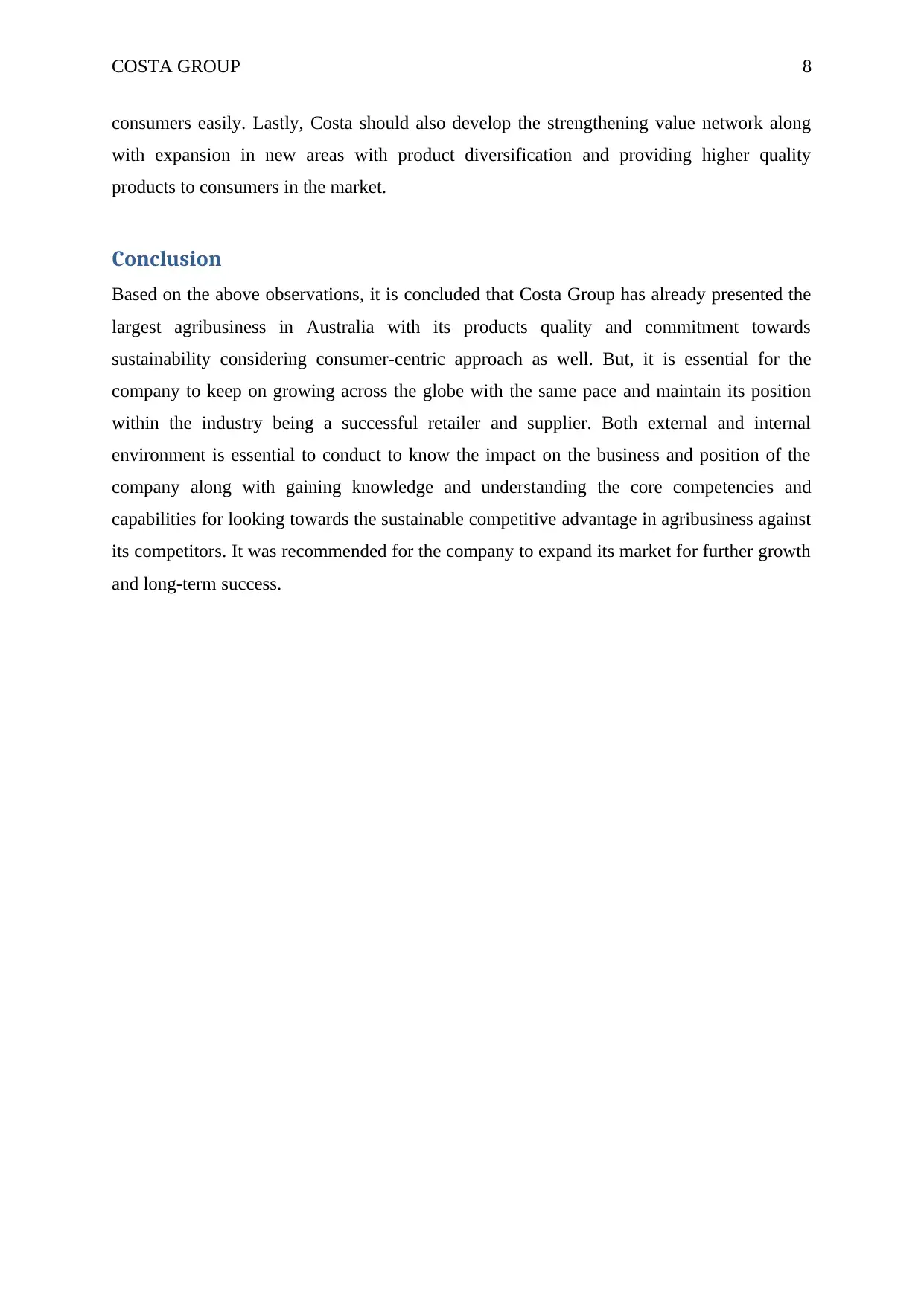
COSTA GROUP 8
consumers easily. Lastly, Costa should also develop the strengthening value network along
with expansion in new areas with product diversification and providing higher quality
products to consumers in the market.
Conclusion
Based on the above observations, it is concluded that Costa Group has already presented the
largest agribusiness in Australia with its products quality and commitment towards
sustainability considering consumer-centric approach as well. But, it is essential for the
company to keep on growing across the globe with the same pace and maintain its position
within the industry being a successful retailer and supplier. Both external and internal
environment is essential to conduct to know the impact on the business and position of the
company along with gaining knowledge and understanding the core competencies and
capabilities for looking towards the sustainable competitive advantage in agribusiness against
its competitors. It was recommended for the company to expand its market for further growth
and long-term success.
consumers easily. Lastly, Costa should also develop the strengthening value network along
with expansion in new areas with product diversification and providing higher quality
products to consumers in the market.
Conclusion
Based on the above observations, it is concluded that Costa Group has already presented the
largest agribusiness in Australia with its products quality and commitment towards
sustainability considering consumer-centric approach as well. But, it is essential for the
company to keep on growing across the globe with the same pace and maintain its position
within the industry being a successful retailer and supplier. Both external and internal
environment is essential to conduct to know the impact on the business and position of the
company along with gaining knowledge and understanding the core competencies and
capabilities for looking towards the sustainable competitive advantage in agribusiness against
its competitors. It was recommended for the company to expand its market for further growth
and long-term success.
⊘ This is a preview!⊘
Do you want full access?
Subscribe today to unlock all pages.

Trusted by 1+ million students worldwide
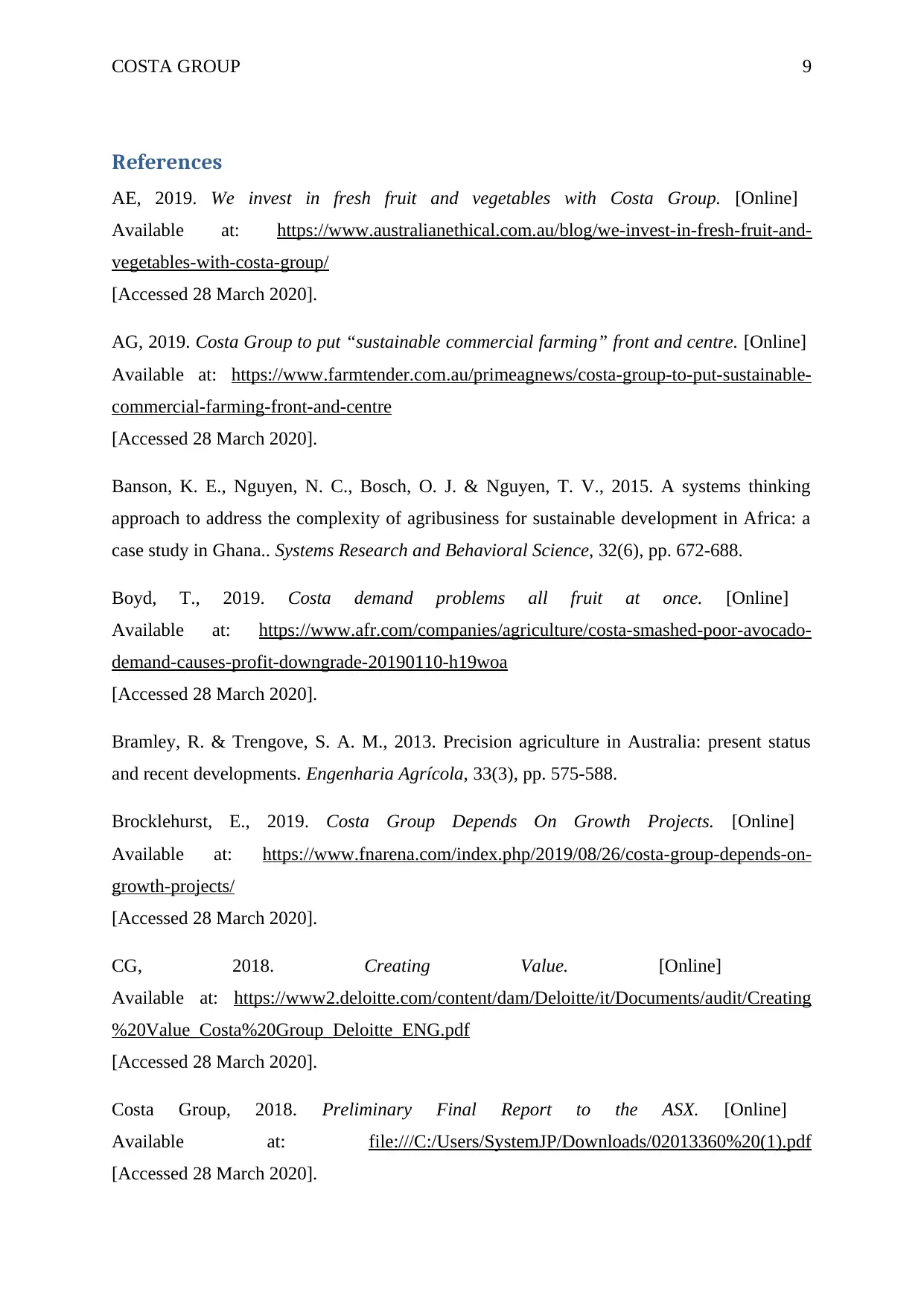
COSTA GROUP 9
References
AE, 2019. We invest in fresh fruit and vegetables with Costa Group. [Online]
Available at: https://www.australianethical.com.au/blog/we-invest-in-fresh-fruit-and-
vegetables-with-costa-group/
[Accessed 28 March 2020].
AG, 2019. Costa Group to put “sustainable commercial farming” front and centre. [Online]
Available at: https://www.farmtender.com.au/primeagnews/costa-group-to-put-sustainable-
commercial-farming-front-and-centre
[Accessed 28 March 2020].
Banson, K. E., Nguyen, N. C., Bosch, O. J. & Nguyen, T. V., 2015. A systems thinking
approach to address the complexity of agribusiness for sustainable development in Africa: a
case study in Ghana.. Systems Research and Behavioral Science, 32(6), pp. 672-688.
Boyd, T., 2019. Costa demand problems all fruit at once. [Online]
Available at: https://www.afr.com/companies/agriculture/costa-smashed-poor-avocado-
demand-causes-profit-downgrade-20190110-h19woa
[Accessed 28 March 2020].
Bramley, R. & Trengove, S. A. M., 2013. Precision agriculture in Australia: present status
and recent developments. Engenharia Agrícola, 33(3), pp. 575-588.
Brocklehurst, E., 2019. Costa Group Depends On Growth Projects. [Online]
Available at: https://www.fnarena.com/index.php/2019/08/26/costa-group-depends-on-
growth-projects/
[Accessed 28 March 2020].
CG, 2018. Creating Value. [Online]
Available at: https://www2.deloitte.com/content/dam/Deloitte/it/Documents/audit/Creating
%20Value_Costa%20Group_Deloitte_ENG.pdf
[Accessed 28 March 2020].
Costa Group, 2018. Preliminary Final Report to the ASX. [Online]
Available at: file:///C:/Users/SystemJP/Downloads/02013360%20(1).pdf
[Accessed 28 March 2020].
References
AE, 2019. We invest in fresh fruit and vegetables with Costa Group. [Online]
Available at: https://www.australianethical.com.au/blog/we-invest-in-fresh-fruit-and-
vegetables-with-costa-group/
[Accessed 28 March 2020].
AG, 2019. Costa Group to put “sustainable commercial farming” front and centre. [Online]
Available at: https://www.farmtender.com.au/primeagnews/costa-group-to-put-sustainable-
commercial-farming-front-and-centre
[Accessed 28 March 2020].
Banson, K. E., Nguyen, N. C., Bosch, O. J. & Nguyen, T. V., 2015. A systems thinking
approach to address the complexity of agribusiness for sustainable development in Africa: a
case study in Ghana.. Systems Research and Behavioral Science, 32(6), pp. 672-688.
Boyd, T., 2019. Costa demand problems all fruit at once. [Online]
Available at: https://www.afr.com/companies/agriculture/costa-smashed-poor-avocado-
demand-causes-profit-downgrade-20190110-h19woa
[Accessed 28 March 2020].
Bramley, R. & Trengove, S. A. M., 2013. Precision agriculture in Australia: present status
and recent developments. Engenharia Agrícola, 33(3), pp. 575-588.
Brocklehurst, E., 2019. Costa Group Depends On Growth Projects. [Online]
Available at: https://www.fnarena.com/index.php/2019/08/26/costa-group-depends-on-
growth-projects/
[Accessed 28 March 2020].
CG, 2018. Creating Value. [Online]
Available at: https://www2.deloitte.com/content/dam/Deloitte/it/Documents/audit/Creating
%20Value_Costa%20Group_Deloitte_ENG.pdf
[Accessed 28 March 2020].
Costa Group, 2018. Preliminary Final Report to the ASX. [Online]
Available at: file:///C:/Users/SystemJP/Downloads/02013360%20(1).pdf
[Accessed 28 March 2020].
Paraphrase This Document
Need a fresh take? Get an instant paraphrase of this document with our AI Paraphraser
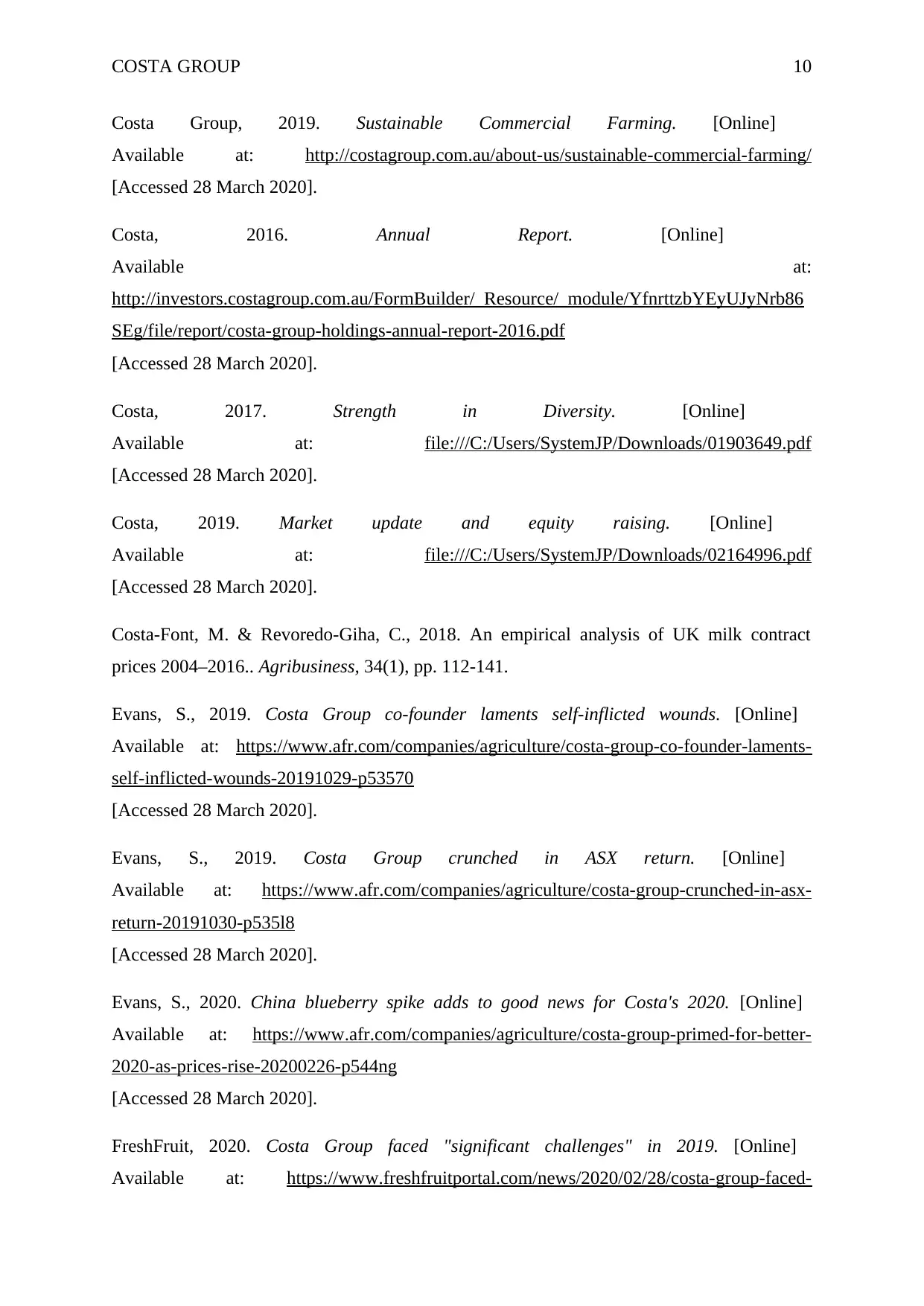
COSTA GROUP 10
Costa Group, 2019. Sustainable Commercial Farming. [Online]
Available at: http://costagroup.com.au/about-us/sustainable-commercial-farming/
[Accessed 28 March 2020].
Costa, 2016. Annual Report. [Online]
Available at:
http://investors.costagroup.com.au/FormBuilder/_Resource/_module/YfnrttzbYEyUJyNrb86
SEg/file/report/costa-group-holdings-annual-report-2016.pdf
[Accessed 28 March 2020].
Costa, 2017. Strength in Diversity. [Online]
Available at: file:///C:/Users/SystemJP/Downloads/01903649.pdf
[Accessed 28 March 2020].
Costa, 2019. Market update and equity raising. [Online]
Available at: file:///C:/Users/SystemJP/Downloads/02164996.pdf
[Accessed 28 March 2020].
Costa‐Font, M. & Revoredo‐Giha, C., 2018. An empirical analysis of UK milk contract
prices 2004–2016.. Agribusiness, 34(1), pp. 112-141.
Evans, S., 2019. Costa Group co-founder laments self-inflicted wounds. [Online]
Available at: https://www.afr.com/companies/agriculture/costa-group-co-founder-laments-
self-inflicted-wounds-20191029-p53570
[Accessed 28 March 2020].
Evans, S., 2019. Costa Group crunched in ASX return. [Online]
Available at: https://www.afr.com/companies/agriculture/costa-group-crunched-in-asx-
return-20191030-p535l8
[Accessed 28 March 2020].
Evans, S., 2020. China blueberry spike adds to good news for Costa's 2020. [Online]
Available at: https://www.afr.com/companies/agriculture/costa-group-primed-for-better-
2020-as-prices-rise-20200226-p544ng
[Accessed 28 March 2020].
FreshFruit, 2020. Costa Group faced "significant challenges" in 2019. [Online]
Available at: https://www.freshfruitportal.com/news/2020/02/28/costa-group-faced-
Costa Group, 2019. Sustainable Commercial Farming. [Online]
Available at: http://costagroup.com.au/about-us/sustainable-commercial-farming/
[Accessed 28 March 2020].
Costa, 2016. Annual Report. [Online]
Available at:
http://investors.costagroup.com.au/FormBuilder/_Resource/_module/YfnrttzbYEyUJyNrb86
SEg/file/report/costa-group-holdings-annual-report-2016.pdf
[Accessed 28 March 2020].
Costa, 2017. Strength in Diversity. [Online]
Available at: file:///C:/Users/SystemJP/Downloads/01903649.pdf
[Accessed 28 March 2020].
Costa, 2019. Market update and equity raising. [Online]
Available at: file:///C:/Users/SystemJP/Downloads/02164996.pdf
[Accessed 28 March 2020].
Costa‐Font, M. & Revoredo‐Giha, C., 2018. An empirical analysis of UK milk contract
prices 2004–2016.. Agribusiness, 34(1), pp. 112-141.
Evans, S., 2019. Costa Group co-founder laments self-inflicted wounds. [Online]
Available at: https://www.afr.com/companies/agriculture/costa-group-co-founder-laments-
self-inflicted-wounds-20191029-p53570
[Accessed 28 March 2020].
Evans, S., 2019. Costa Group crunched in ASX return. [Online]
Available at: https://www.afr.com/companies/agriculture/costa-group-crunched-in-asx-
return-20191030-p535l8
[Accessed 28 March 2020].
Evans, S., 2020. China blueberry spike adds to good news for Costa's 2020. [Online]
Available at: https://www.afr.com/companies/agriculture/costa-group-primed-for-better-
2020-as-prices-rise-20200226-p544ng
[Accessed 28 March 2020].
FreshFruit, 2020. Costa Group faced "significant challenges" in 2019. [Online]
Available at: https://www.freshfruitportal.com/news/2020/02/28/costa-group-faced-
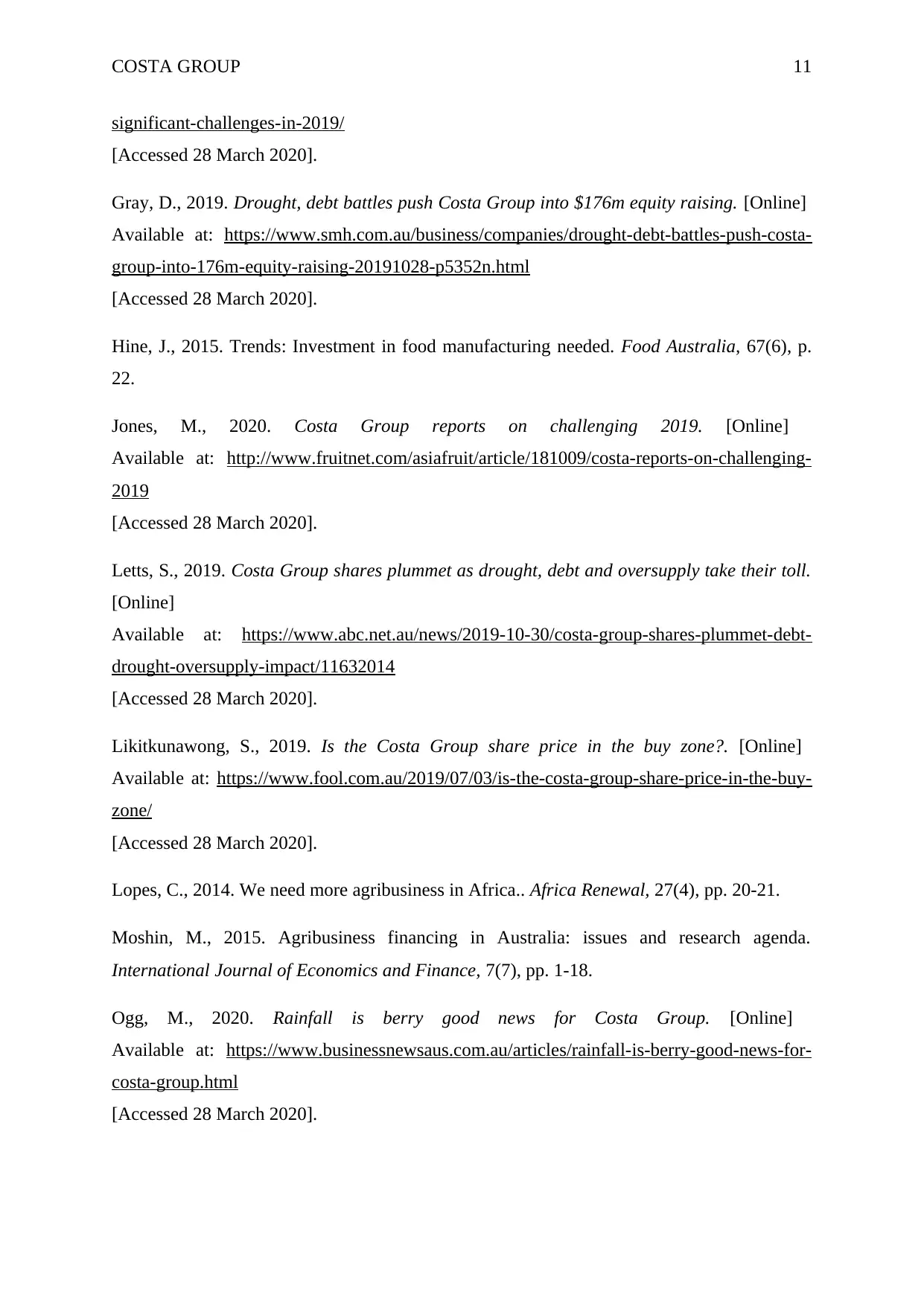
COSTA GROUP 11
significant-challenges-in-2019/
[Accessed 28 March 2020].
Gray, D., 2019. Drought, debt battles push Costa Group into $176m equity raising. [Online]
Available at: https://www.smh.com.au/business/companies/drought-debt-battles-push-costa-
group-into-176m-equity-raising-20191028-p5352n.html
[Accessed 28 March 2020].
Hine, J., 2015. Trends: Investment in food manufacturing needed. Food Australia, 67(6), p.
22.
Jones, M., 2020. Costa Group reports on challenging 2019. [Online]
Available at: http://www.fruitnet.com/asiafruit/article/181009/costa-reports-on-challenging-
2019
[Accessed 28 March 2020].
Letts, S., 2019. Costa Group shares plummet as drought, debt and oversupply take their toll.
[Online]
Available at: https://www.abc.net.au/news/2019-10-30/costa-group-shares-plummet-debt-
drought-oversupply-impact/11632014
[Accessed 28 March 2020].
Likitkunawong, S., 2019. Is the Costa Group share price in the buy zone?. [Online]
Available at: https://www.fool.com.au/2019/07/03/is-the-costa-group-share-price-in-the-buy-
zone/
[Accessed 28 March 2020].
Lopes, C., 2014. We need more agribusiness in Africa.. Africa Renewal, 27(4), pp. 20-21.
Moshin, M., 2015. Agribusiness financing in Australia: issues and research agenda.
International Journal of Economics and Finance, 7(7), pp. 1-18.
Ogg, M., 2020. Rainfall is berry good news for Costa Group. [Online]
Available at: https://www.businessnewsaus.com.au/articles/rainfall-is-berry-good-news-for-
costa-group.html
[Accessed 28 March 2020].
significant-challenges-in-2019/
[Accessed 28 March 2020].
Gray, D., 2019. Drought, debt battles push Costa Group into $176m equity raising. [Online]
Available at: https://www.smh.com.au/business/companies/drought-debt-battles-push-costa-
group-into-176m-equity-raising-20191028-p5352n.html
[Accessed 28 March 2020].
Hine, J., 2015. Trends: Investment in food manufacturing needed. Food Australia, 67(6), p.
22.
Jones, M., 2020. Costa Group reports on challenging 2019. [Online]
Available at: http://www.fruitnet.com/asiafruit/article/181009/costa-reports-on-challenging-
2019
[Accessed 28 March 2020].
Letts, S., 2019. Costa Group shares plummet as drought, debt and oversupply take their toll.
[Online]
Available at: https://www.abc.net.au/news/2019-10-30/costa-group-shares-plummet-debt-
drought-oversupply-impact/11632014
[Accessed 28 March 2020].
Likitkunawong, S., 2019. Is the Costa Group share price in the buy zone?. [Online]
Available at: https://www.fool.com.au/2019/07/03/is-the-costa-group-share-price-in-the-buy-
zone/
[Accessed 28 March 2020].
Lopes, C., 2014. We need more agribusiness in Africa.. Africa Renewal, 27(4), pp. 20-21.
Moshin, M., 2015. Agribusiness financing in Australia: issues and research agenda.
International Journal of Economics and Finance, 7(7), pp. 1-18.
Ogg, M., 2020. Rainfall is berry good news for Costa Group. [Online]
Available at: https://www.businessnewsaus.com.au/articles/rainfall-is-berry-good-news-for-
costa-group.html
[Accessed 28 March 2020].
⊘ This is a preview!⊘
Do you want full access?
Subscribe today to unlock all pages.

Trusted by 1+ million students worldwide
1 out of 13
Related Documents
Your All-in-One AI-Powered Toolkit for Academic Success.
+13062052269
info@desklib.com
Available 24*7 on WhatsApp / Email
![[object Object]](/_next/static/media/star-bottom.7253800d.svg)
Unlock your academic potential
Copyright © 2020–2026 A2Z Services. All Rights Reserved. Developed and managed by ZUCOL.





